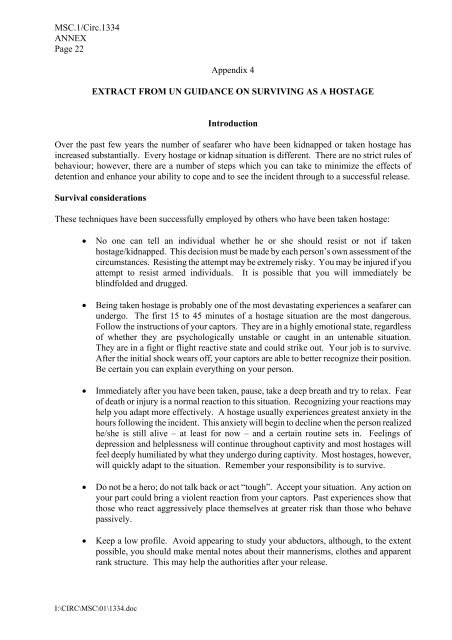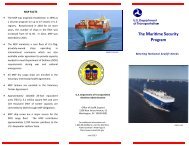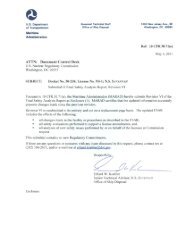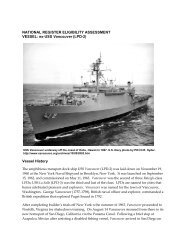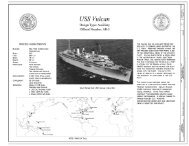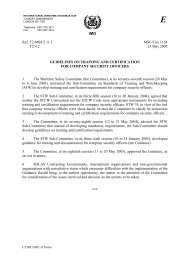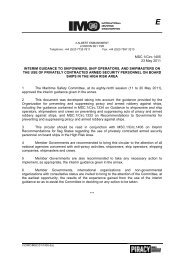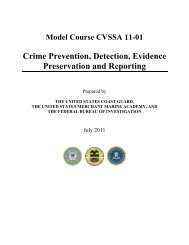Piracy and Armed Robbery Against Ships - Maritime Administration
Piracy and Armed Robbery Against Ships - Maritime Administration
Piracy and Armed Robbery Against Ships - Maritime Administration
- No tags were found...
Create successful ePaper yourself
Turn your PDF publications into a flip-book with our unique Google optimized e-Paper software.
MSC.1/Circ.1334ANNEXPage 22Appendix 4EXTRACT FROM UN GUIDANCE ON SURVIVING AS A HOSTAGEIntroductionOver the past few years the number of seafarer who have been kidnapped or taken hostage hasincreased substantially. Every hostage or kidnap situation is different. There are no strict rules ofbehaviour; however, there are a number of steps which you can take to minimize the effects ofdetention <strong>and</strong> enhance your ability to cope <strong>and</strong> to see the incident through to a successful release.Survival considerationsThese techniques have been successfully employed by others who have been taken hostage:• No one can tell an individual whether he or she should resist or not if takenhostage/kidnapped. This decision must be made by each person’s own assessment of thecircumstances. Resisting the attempt may be extremely risky. You may be injured if youattempt to resist armed individuals. It is possible that you will immediately beblindfolded <strong>and</strong> drugged.• Being taken hostage is probably one of the most devastating experiences a seafarer canundergo. The first 15 to 45 minutes of a hostage situation are the most dangerous.Follow the instructions of your captors. They are in a highly emotional state, regardlessof whether they are psychologically unstable or caught in an untenable situation.They are in a fight or flight reactive state <strong>and</strong> could strike out. Your job is to survive.After the initial shock wears off, your captors are able to better recognize their position.Be certain you can explain everything on your person.• Immediately after you have been taken, pause, take a deep breath <strong>and</strong> try to relax. Fearof death or injury is a normal reaction to this situation. Recognizing your reactions mayhelp you adapt more effectively. A hostage usually experiences greatest anxiety in thehours following the incident. This anxiety will begin to decline when the person realizedhe/she is still alive – at least for now – <strong>and</strong> a certain routine sets in. Feelings ofdepression <strong>and</strong> helplessness will continue throughout captivity <strong>and</strong> most hostages willfeel deeply humiliated by what they undergo during captivity. Most hostages, however,will quickly adapt to the situation. Remember your responsibility is to survive.• Do not be a hero; do not talk back or act “tough”. Accept your situation. Any action onyour part could bring a violent reaction from your captors. Past experiences show thatthose who react aggressively place themselves at greater risk than those who behavepassively.• Keep a low profile. Avoid appearing to study your abductors, although, to the extentpossible, you should make mental notes about their mannerisms, clothes <strong>and</strong> apparentrank structure. This may help the authorities after your release.I:\CIRC\MSC\01\1334.doc


